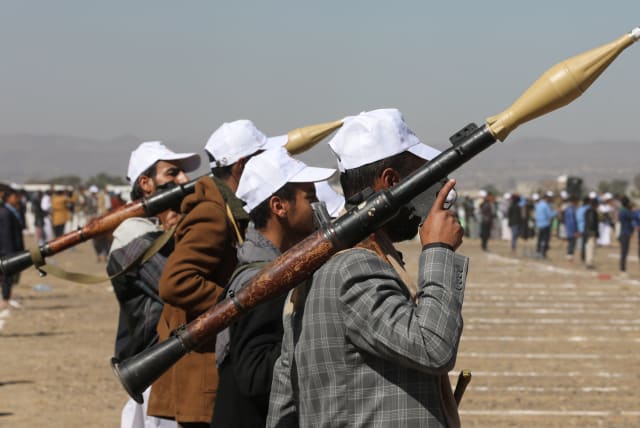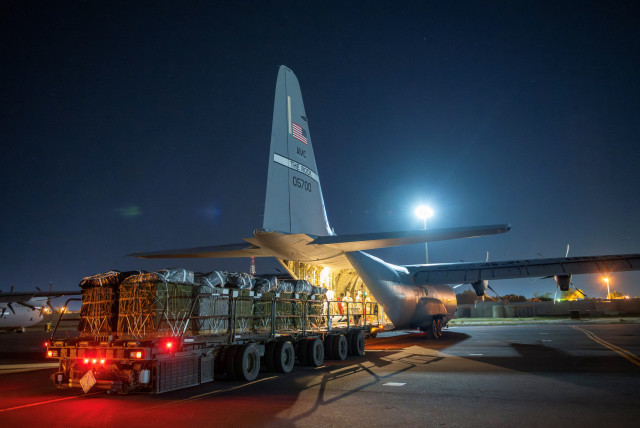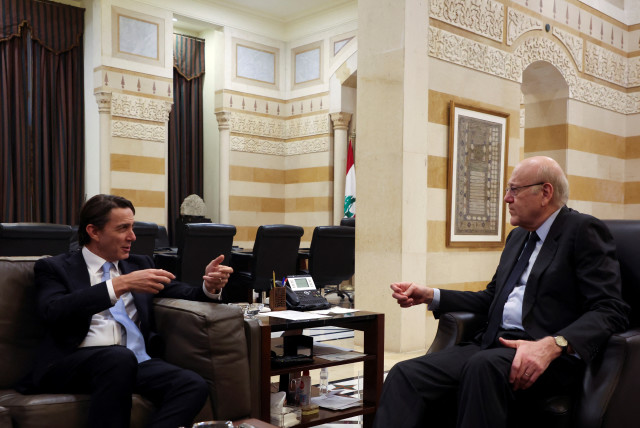
US forces on Tuesday shot down one anti-ship ballistic missile and three one-way attack unmanned aerial systems launched from Iranian-backed Houthi-controlled areas of Yemen toward the USS Carney in the Red Sea, the US Central Command said.
US forces later destroyed three anti-ship missiles and three unmanned surface vessels in self-defense, Centcom said in a statement.
Go to the full article >>The United States conducted its second airdrop of food over Gaza on Tuesday, as its official continued to hammer Israel over hunger in the enclave, and US President Joe Biden said he was doing everything possible to help Palestinians there.
“The United States is committed to pulling out every stop to get more aid to those in Gaza who desperately need it,” Biden said in a post on X.
“We won't stand by. We won't let up,” Biden said.
The United States is committed to pulling out every stop to get more aid to those in Gaza who desperately need it.
— President Biden (@POTUS) March 5, 2024
We won't stand by.
We won't let up.

“The situation for children, for women, for men who are caught in this crossfire of Hamas’s making inside of Gaza is unacceptable and unsustainable. Israel has to maximize every possible means, every possible method of getting assistance to people who need it.”
He spoke just before holding back-to-back meetings with Minister Benny Gantz and Qatari Prime Minister Mohammed Al-Thani.
Indirect talks on an end to hostilities along the Lebanese-Israeli border will begin during the Muslim holy month of Ramadan which starts next week, Lebanon's caretaker prime minister Najib Mikati said on Tuesday.
The powerful Lebanese terror group Hezbollah and Israel have been exchanging fire for nearly five months in parallel with the Gaza war, prompting diplomatic efforts aimed at staving off an escalation.
In an interview Tuesday night with local Lebanese broadcaster Al Jadeed, Mikati said Lebanon's parliament speaker Nabih Berri - who is close to Hezbollah - was studying a proposal suggested verbally by US envoy Amos Hochstein, who was in Beirut on Monday.
Mikati said the proposal centered on how to fully implement United Nations Security Council Resolution 1701, which ended the month-long war fought in 2006 between Hezbollah and Israel.
It calls for a withdrawal of non-state armed actors from southern Lebanon and a deployment of up to 15,000 Lebanese army troops. Lebanon has accused Israel of violating the resolution more than 30,000 times and says it would be ready to implement it fully.

Mikati said he planned to speak to Hochstein within the next 48 hours about the proposal, particularly to learn Israel's position as the US envoy traveled on to Tel Aviv from Beirut.
He said the timeline for implementation was "elastic."
Go to the full article >>Hamas publicly insisted that a permanent ceasefire must be in place before any deal for the release of the remaining 134 hostages held in Gaza, in a statement that seemed to run counter to optimism from Washington that an agreement was possible before the start of the holy month of Ramadan.
"In the past two days, the movement presented its position on the proposal put forward by the brotherly Qatari and Egyptian mediators,” senior Hamas official Osama Hamdan said on Tuesday in Beirut.
He spoke as ceasefire talks mediated by both Egypt and Qatar continued in Cairo with no sign of a breakthrough.
“We reaffirmed our conditions for a ceasefire: a full pullout from the Strip and the return of the displaced [Palestinians] from areas they left, in particular in the north," he said.
Hamdan repeated his group's conditions for a deal; an end to the Gaza war, a withdrawal of Israeli troops, and the return of displaced Palestinians to homes they have fled in other parts of the enclave.
Israel has insisted that it must be allowed to complete its military campaign in Gaza to destroy Hamas. The current proposal on the table attempts to bypass the gap between the two sides by putting in place a six-week pause in exchange for the release of 40 hostages. Israel would, in exchange, free from its jails some 400 security prisoners and terrorists.
US officials continued to push from Washington for a deal, with US Secretary of State Antony Blinken holding back-to-back meetings with Qatari Prime Minister Mohammed Al-Thani and Minister Benny Gantz.
US President Joe Biden, National Security Communications Adviser John Kirby, and State Department Matthew Miller clarified in their public comments that the onus remained on Hamas.
Before boarding Air Force One on Tuesday Biden said that a deal “was it’s in the hands of Hamas right now. Israelis have been cooperating. There’s been a rational offer. We will know in a couple of days what’s gonna happen. We need a ceasefire.”
It was particularly important to secure a six-week pause to the war before the start of Ramadan.
The war continues into Ramadan, Biden said, “it’s gonna be very dangerous. So, we are trying very, very hard to get a ceasefire.”
Blinken before his meeting with Thani said, “We have an opportunity for an immediate ceasefire that can bring hostages home, that can dramatically increase the amount of humanitarian assistance getting into Palestinians who so desperately need it, and can also set the conditions for an enduring resolution.
“It is on Hamas to make decisions about whether it is prepared to engage in that ceasefire,” he said before meeting Thani.
A senior Hamas official told NBC that it was the US that must pressure Israel to reach a deal. "It is now in the hands of the Americans if they are serious about achieving a ceasefire before Ramadan," NBC quoted the official as saying.
Three security sources from host and mediator Egypt told Reuters the warring sides still wanted a deal but were sticking to demands that had held up an agreement so far. The Egyptians have remained in contact with the Israelis despite the absence of an Israeli delegation in Cairo.
Naim told Reuters the group had presented its proposal for a ceasefire agreement to the mediators, and was now waiting for a response from the Israelis, who have stayed away from this round.
"(Prime Minister Benjamin) Netanyahu doesn't want to reach an agreement and the ball now is in the Americans' court" to press him for a deal, Naim said.
Israel has declined to comment publicly on the talks in Cairo but a senior Israeli official denied Israel was holding up a deal: "Israel is making every effort to reach an agreement. We are awaiting a response from Hamas."
A source had told Reuters earlier that Israel was staying away because Hamas had rejected its demand to furnish a list of all hostages who are still alive. Naim said this was impossible without a ceasefire first as hostages were scattered across the war zone and held by separate groups.
The Egyptian security sources said US, Egyptian, and Qatari mediators were seeking to overcome this difference by offering separate guarantees to Hamas of peace talks to end the war.
A barrage of 30 rockets was launched from Lebanon towards the city of Kiryat Shmona Tuesday evening, the northernmost city's municipality said.
The Kiryat Shmona municipality spokesperson added, "During the barrage, 30 rockets were detected, of which 13 were intercepted, and 17 fell outside of the city in open areas. Currently, there are no injuries reported."
Hezbollah-affiliated news source Al-Mayadeen has reported that the IDF has begun attacking targets in Southern Lebanon as a response, but this is yet to be confirmed by Israeli sources.
Go to the full article >>The head of the research division of the Intelligence Branch of the IDF, Brigadier-General Amit Sa'ar, revealed in an interview with KAN News on Tuesday that he wrote an emergency warning letter about a potential attack on Israel that was meant to be sent to Prime Minister Benjamin Netanyahu and members of the national security cabinet after Simchat Torah.
According to his report, Sa'ar warned in his letter that Iran, Hamas, and Hezbollah recognized an opportunity to attack Israel, according to information gathered by the Intelligence Division.
The warning, which was written just before October 7, was reportedly able to reach the head of the IDF Intelligence Branch, and IDF Chief of staff Herzi Halevi.
Additionally, Sa'ar claims that he wrote in the letter that this opportunity was created due to internal conflict in Israel, as well as the level of readiness of the IDF at the time.
The head of the research division also added in his letter that senior Iranian officials also pressured Hamas, stating that the moment to attack Israel had arrived.
Go to the full article >>Indirect talks on an end to hostilities along the Lebanese-Israeli border will begin during the Muslim holy month of Ramadan which starts next week, Lebanon's caretaker prime minister Najib Mikati said on Tuesday.
Mikati told local broadcaster Al Jadeed that Lebanese officials were studying a verbal proposal suggested by US envoy Amos Hochstein, who was in Beirut on Monday to push a diplomatic solution to exchanges of fire between the powerful Lebanese terrorist group Hezbollah and Israel.
This is a developing story.
Go to the full article >>The United States is looking at both military and commercial options to move humanitarian assistance into Gaza from sea routes, the White House said on Tuesday.
John Kirby, the White House national security spokesperson, told reporters the maritime route can move more volume of aid but it is more of a heavier lift logistically. Trucks are the best way, he said.
This is a developing story.
Go to the full article >>US Secretary of State Antony Blinken discussed with Israeli war cabinet member Benny Gantz in a meeting on Tuesday the need to act urgently to enable the delivery of humanitarian aid, State Department spokesperson Matthew Miller told reporters.
The two also discussed efforts to reach an agreement on a six-week ceasefire in Gaza between Israel and Hamas, Miller said. Obstacles to a Gaza ceasefire are not insurmountable, Miller stated, adding that in Washington's view, it is possible to reach an agreement between Israel and Hamas.
This is a developing story.
Go to the full article >>There will be no initial changes regarding entry to the Temple Mount during Ramadan, according to the decision of a security establishment meeting led by Prime Minister Benjamin Netanyahu on Tuesday.
The official decision of the meeting stated that during the first week of Ramadan, no new limitations would be placed, and the number of east Jerusalem and West Bank Muslims allowed into the Temple Mount will remain the same as previous years.
Every week after that, there will be an official situational assessment, and decisions to change the limitations will be made accordingly.
According to Israeli media reports, this model was recommended by the IDF and the Shin Bet.
Prime Minister Benjamin Netanyahu said at the beginning of the meeting that Israel will do "everything" to ensure freedom of worship during Ramadan while also "maintaining security and safety needs."
"Israel's policy has always been and always will be to maintain the freedom of worship for all religions. Of course, we have done this during the Ramadan holiday in the past, and we will do it again now," he said.
"We will do everything to maintain the freedom of worship on the Temple Mount while appropriately maintaining security and safety needs, and we will allow the Muslim public to celebrate the holiday," he said.
Go to the full article >>





